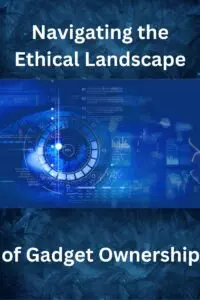
Are you like me and ‘addicted to tech and gadgets? We love the don’t we? But why are gadgets so addictive? Is it the case of FOMO ( fear of missing out?).
You know what i mean, your mate has that new gaming headset that he says lets you hear someone reload from the other side of the map and you look at your 3-year-old headset that needs 4 double AA’s every hour and you feel like an old timer!!
Like phones, Apple tends to bring out a new phone just as you’ve thrown the box out of yours!! Do you then pay your contract out and buy the latest one or stick with your ‘outdated’ one till you’re out of contract but hate your once-loved phone till you can change?
So why are gadgets so addictive?
As silly as this sounds, there is a number of scientific and psychological reasons for our “gadget addiction’ are they may not be as silly as you first thought. To me, as usual, the instant blame can be placed upon social media. Is gadget addiction even a thing? check this study by Berkley University here
Disclaimer: I’ve placed that in speech marks as to not belittle the real problems of serious addictions, but remember this is a gadget blog and I’m certainly not an expert in real addictions!!
The Alluring Glow: Unveiling the Psychology of why gadgets are so addictive
In a world bathed in the blue light of screens, a silent epidemic grips our attention: gadget addiction. From smartphones clutched to restless hands to fitness trackers whispering seductive metrics like tracking your workouts, forget that lets track your walk to the chippy.
When I got my new Apple Watch that could track my sleep, what did I do? Kept it on all night to asses my sleep, did it give me a better idea of how I slept? Did it shite! In fact, it just kept me awake every time i turned over, but at least i have the ability to track my sleep if I want!!
But why, in the face of endless possibilities, do we find ourselves tethered to these glowing rectangles? The answer lies in a potent cocktail of psychological manipulation, technological allure, and the ever-present yearning for social connection.
Dopamine’s Dance: The Neurochemical Hook

At the heart of gadget addiction’s grip lies dopamine, the brain’s reward neurotransmitter. For me even recieving that new shiny box through the post is a buzz and the excitment only grows as i go through the unboxing!! Every notification ping, every game cleared, every curated feed refresh triggers a tiny dopamine release, a pleasurable surge reinforcing the behaviour.
Social media likes and comments become virtual pats on the head, while endless game levels offer the tantalising promise of mastery and victory. This constant drip of dopamine keeps us hooked, seeking the next fix, even when the real world beckons. How many times have you been late after ‘just one more game’?
Escape from the Mundane: A Digital Refuge

Beyond the dopamine rush, gadgets offer an escape from the complexities of real life. And we all need a little escapism every now and then.
Some people go for a run, some go out on the ale, I like to shoot virtual enemies whilst immersed in a digitally created war zone!!
The humdrum of daily routines fades as we lose ourselves in virtual worlds, be it the curated perfection of Instagram or the adrenaline rush of online gaming. This escapism, while initially soothing, can become a maladaptive coping mechanism, masking anxieties and hindering emotional growth.
Fear of Missing Out: The Social Siren’s Song

In the age of hyperconnectivity, the fear of missing out (FOMO) casts a long shadow. Social media platforms amplify this fear, bombarding us with a curated reality of perfect lives and exciting adventures.
If one of your mates gets a new smartwatch, you can handle that, but if 10 minutes on insta reveals everybody and his dog has that new kick-ass smartwatch, that’s gonna be hard to resist, your mind will play tricks on you, you’ll think ‘if I go and meet the lads and they see thing old thing, they’ll laugh me out the pub!”
The constant stream of updates and notifications creates a sense of urgency, a need to stay plugged in lest we miss the next viral trend or the latest gossip. This FOMO fuels compulsive checking and scrolling, further blurring the lines between the digital and the real.
The Architect’s Art: A World Designed for Engagement
Gadgets are not merely passive tools; they are meticulously designed to capture and hold our attention. Algorithms tailor content to our individual preferences, feeding us with what we crave, keeping us scrolling through endless feeds, unless you know how to block ads and your privacy settings are tip-top.
Variable reward schedules, like the uncertain timing of social media notifications or the unpredictable loot drops in games, fuel our anticipation and keep us coming back for more.
In the UK for instance loot boxes have been considered to be a lower form of gambling and it’s being talked about being regulated by the gambling license authority.
The sleek interfaces and intuitive controls provide a frictionless experience, further solidifying our digital dependency.
Breaking the Chains: A Path to Digital Detox
The allure of gadgets is undeniable, but it is important to remember that we hold the power to reclaim control. Recognising the psychological and technological factors that drive addiction is the first step.
Mindfulness practices can help us become aware of our digital habits, allowing us to make conscious choices about how we engage with technology. You could even use timers on your phone or smartwatch to restrict your screen time. Setting boundaries, such as designated screen-free times or tech-free zones, can create space for real-world connection and introspection if you feel that’s necessary.
Digital detox, a temporary break from technology, can be a powerful tool for resetting our relationship with gadgets. By stepping away from the constant stimuli, we can reconnect with ourselves, our loved ones, and the world around us. This break can help us rediscover the joy of real-world experiences, and ultimately, return to technology with a renewed sense of balance and control.
The fight against gadget addiction is not about shunning technology entirely; it is about reclaiming our personality and establishing a healthy relationship with the digital world. By understanding the psychological and technological forces at play, we can break free from the alluring glow and reclaim the power to choose how technology serves our lives, rather than the other way around.
Also, there’s an eco issue with gadget addiction, if you’re buying the latest tech as soon as it comes out then what happens to your discarded and unloved tech? check my post on ethical tech ownership here
Final thought
Remember, the struggle against gadget addiction is a journey, not a destination. Be kind to yourself, celebrate small victories, and don’t hesitate to seek support if needed. The world beyond the screen awaits, but remember not to be too hard on yourself as long as you know that your gadget is your servant, not your master!! ( wow hitting some Jerry Springer vibes there!!)





Pingback: Navigating the Ethical Landscape of Gadget Ownership